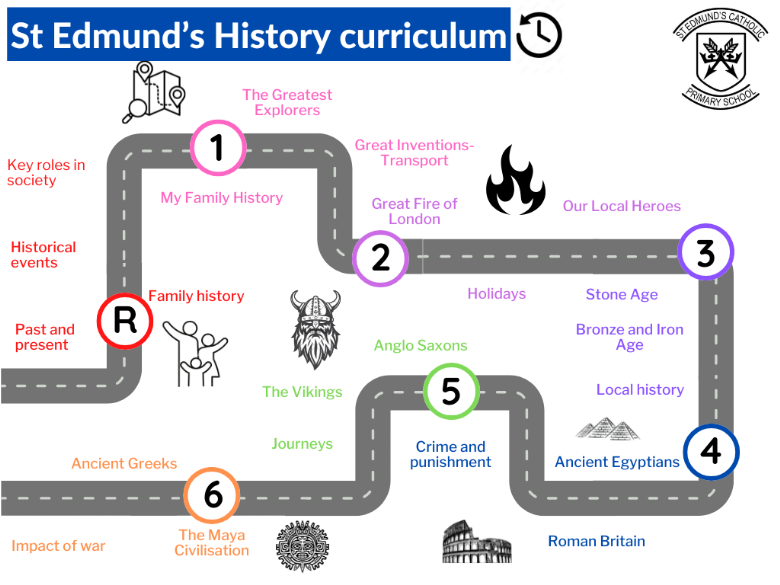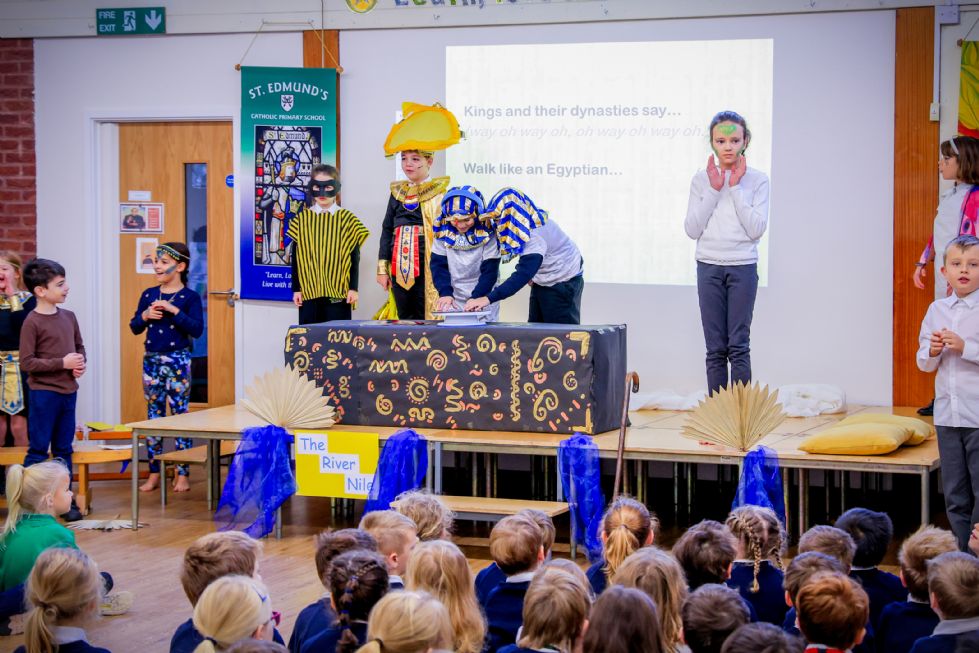History

Intent
|
At St Edmund's we want children to view history as a living field – to feel empowered to act as historians by asking questions and examining sources – rather than as a subject where someone else has all the answers. We encourage children to extend their knowledge by undertaking their own research, and by beginning to develop their own explanations and theories. We also want them to develop confidence in making links between periods, or between cultures, whilst developing a clear understanding of chronology through learning key dates in British history. We can strengthen this by embedding history across the curriculum – for instance giving a historical dimension to scientific discussions about invention or innovation, or ensuring that a sense of the historical period underpins our approach to literature or British values. Our aim is for our pupils to be able to understand and learn from the people from the past who have made the greatest impact. Through following the Rising Stars History scheme, the children cover a range of topics in each year group that expose them to times in the past that can capture their imagination, developing their understanding of our national history and history of the world. Our aim is for children to really appreciate and dive deep into History to become independent and creative learners. We want our children to be critical thinkers and problems solvers and feel empowered to act as historians by asking questions and examining sources, in a range of different formats. To build of their interest from the topics, children are encouraged to develop their understanding of the subject through research, which extends their knowledge further. In doing so, they can begin to develop their own explanations and theories for the past, with their own evidence and deeper understanding. Throughout their History journey at St Edmund’s we aim to equip children with the confidence to make links across time periods, understand chronology and key dates in history and reflect on past events, making them inquisitive learners. The national curriculum for history aims to ensure that all pupils:
|
- gain historical perspective by placing their growing knowledge into different contexts, understanding the connections between local, regional, national and international history; between cultural, economic, military, political, religious and social history; and between short- and long-term timescales.
Implementation
|
History planning for KS1 and KS2 is based-upon by the Rising Stars history scheme of work which is chosen because it is ambitious and delivers the core of knowledge required by the National Curriculum in an interesting and engaging way. Children are required not to simply acquire knowledge but to apply it in meaningful contexts. Questions and tasks to stretch and challenge the most able pupils are incorporated where appropriate. Revisiting ideas and concepts in different, more challenging, contexts in later units, using varied assessments and the inclusion of quizzes are all designed to help pupils remember content and integrate new knowledge into their evolving conceptual framework. Quality resources and materials are provided online to support the history curriculum and are sequenced towards the accumulation of skills, knowledge and understanding, working towards the next key stage. History is delivered in Reception through the ‘Understanding of the World’ element of the Early Years goals. In Key Stage 1 , History is allocated 1hour of curriculum time per week, for 1 half term of each term. It is allocated 18 hours of curriculum time annually. In Key Stage 2, History is allocated 1 ½ hours of curriculum time per week, for 1 half term of each term. It is allocated 27 hours of curriculum time annually. The external curriculum has been enhanced by visitors and trips linked to historical topics to enhance learning and develop cultural capital.
|
Impact
Our history curriculum offers an impactful, well planned knowledge rich lessons which encourage a deep level of historical based learning. Continuity and progression in the curriculum is built around essential knowledge, understanding and key skills within History. These are broken into year group expectations and included additional challenge for all learners.
Children at St Edmund's Catholic Primary School will:
- demonstrate a love of History and an interest in further study
- retain knowledge that is pertinent to History with a real life context
- be able to critically question ideas and reflect on knowledge
- have evidence of work showing a range of topics covered, cross curriculum links and work adapted to their individual needs
- be able to articulate their understanding of historical concepts and be able to reason using rich language linked to the period being studied
- demonstrate a range of transferable skills through their work through organising, recording and interpreting results
- work collaboratively and practically to investigate within their historical based learning
- achieve age related expectations in History at the end of their year.

